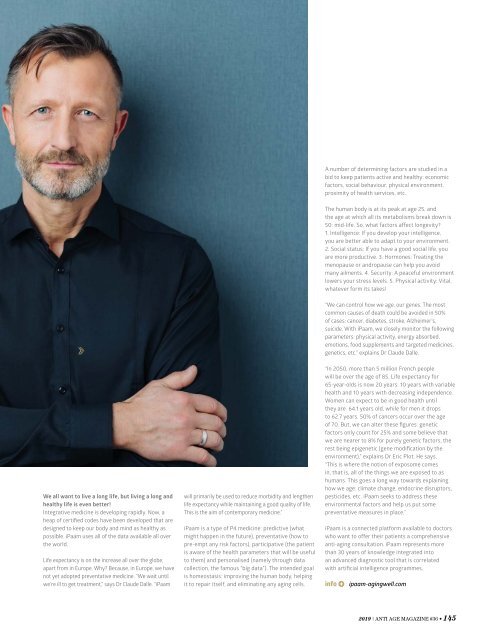ANTI-AGE #36
You also want an ePaper? Increase the reach of your titles
YUMPU automatically turns print PDFs into web optimized ePapers that Google loves.
A number of determining factors are studied in a<br />
bid to keep patients active and healthy: economic<br />
factors, social behaviour, physical environment,<br />
proximity of health services, etc.<br />
The human body is at its peak at age 25, and<br />
the age at which all its metabolisms break down is<br />
50: mid-life. So, what factors affect longevity?<br />
1. Intelligence: If you develop your intelligence,<br />
you are better able to adapt to your environment.<br />
2. Social status: If you have a good social life, you<br />
are more productive. 3. Hormones: Treating the<br />
menopause or andropause can help you avoid<br />
many ailments. 4. Security: A peaceful environment<br />
lowers your stress levels. 5. Physical activity: Vital,<br />
whatever form its takes!<br />
“We can control how we age, our genes. The most<br />
common causes of death could be avoided in 50%<br />
of cases: cancer, diabetes, stroke, Alzheimer’s,<br />
suicide. With iPaam, we closely monitor the following<br />
parameters: physical activity, energy absorbed,<br />
emotions, food supplements and targeted medicines,<br />
genetics, etc.” explains Dr Claude Dalle.<br />
We all want to live a long life, but living a long and<br />
healthy life is even better!<br />
Integrative medicine is developing rapidly. Now, a<br />
heap of certified codes have been developed that are<br />
designed to keep our body and mind as healthy as<br />
possible. iPaam uses all of the data available all over<br />
the world.<br />
Life expectancy is on the increase all over the globe,<br />
apart from in Europe. Why? Because, in Europe, we have<br />
not yet adopted preventative medicine. “We wait until<br />
we’re ill to get treatment,” says Dr Claude Dalle. “iPaam<br />
will primarily be used to reduce morbidity and lengthen<br />
life expectancy while maintaining a good quality of life.<br />
This is the aim of contemporary medicine.”<br />
iPaam is a type of P4 medicine: predictive (what<br />
might happen in the future), preventative (how to<br />
pre-empt any risk factors), participative (the patient<br />
is aware of the health parameters that will be useful<br />
to them) and personalised (namely through data<br />
collection, the famous “big data”). The intended goal<br />
is homeostasis: improving the human body, helping<br />
it to repair itself, and eliminating any aging cells.<br />
“In 2050, more than 5 million French people<br />
will be over the age of 85. Life expectancy for<br />
65-year-olds is now 20 years: 10 years with variable<br />
health and 10 years with decreasing independence.<br />
Women can expect to be in good health until<br />
they are 64.1 years old, while for men it drops<br />
to 62.7 years. 50% of cancers occur over the age<br />
of 70. But, we can alter these figures: genetic<br />
factors only count for 25% and some believe that<br />
we are nearer to 8% for purely genetic factors, the<br />
rest being epigenetic (gene modification by the<br />
environment),” explains Dr Eric Plot. He says,<br />
“This is where the notion of exposome comes<br />
in, that is, all of the things we are exposed to as<br />
humans. This goes a long way towards explaining<br />
how we age: climate change, endocrine disruptors,<br />
pesticides, etc. iPaam seeks to address these<br />
environmental factors and help us put some<br />
preventative measures in place.”<br />
iPaam is a connected platform available to doctors<br />
who want to offer their patients a comprehensive<br />
anti-aging consultation. iPaam represents more<br />
than 30 years of knowledge integrated into<br />
an advanced diagnostic tool that is correlated<br />
with artificial intelligence programmes.<br />
info<br />
: ipaam-agingwell.com<br />
2019 | <strong>ANTI</strong> <strong>AGE</strong> MAGAZINE <strong>#36</strong> • 145

















